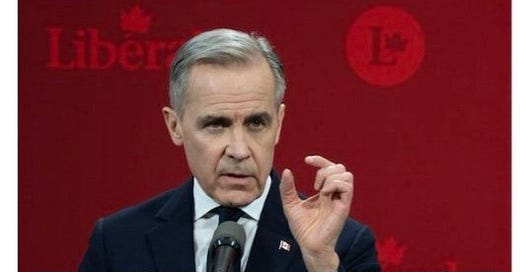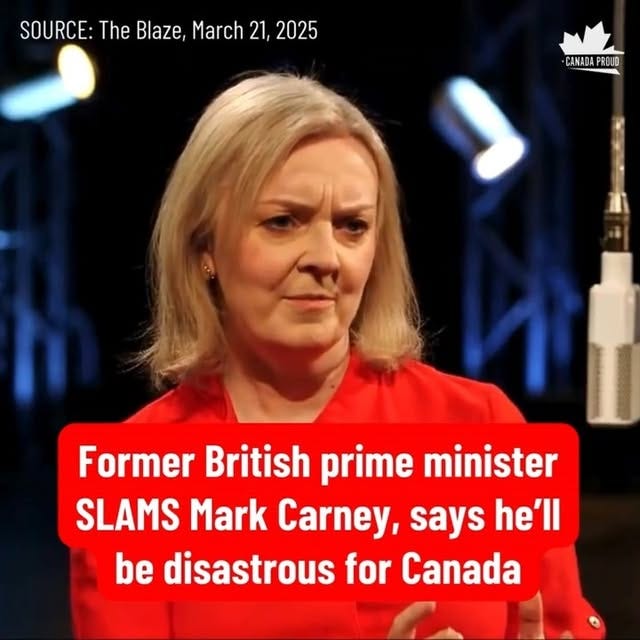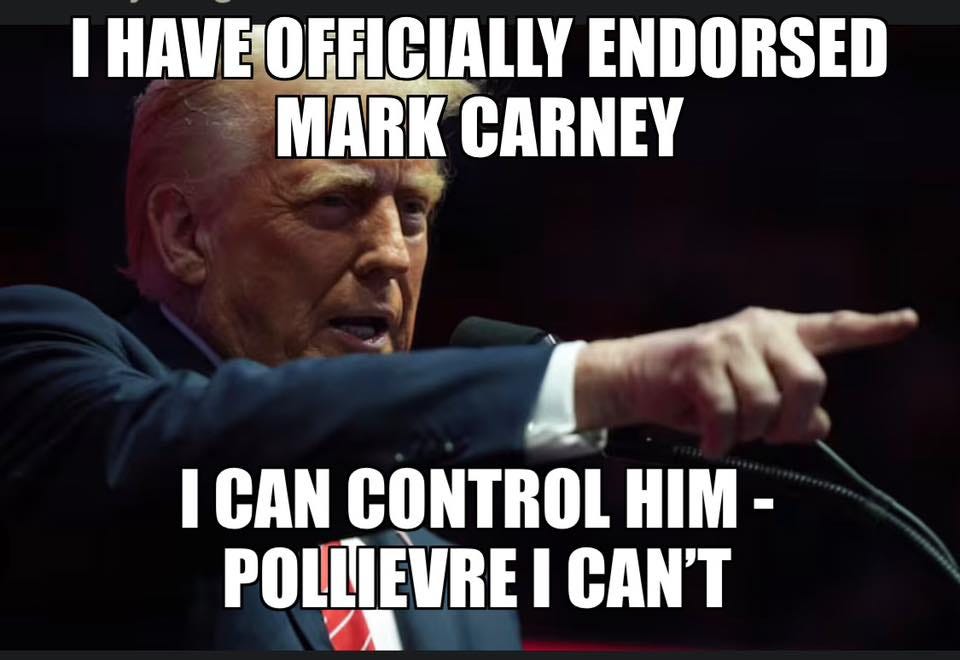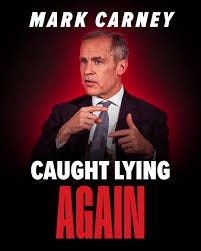Lies and the Lying Liars Who Lie Them
Calling Mark Carney a banker is like calling a brain surgeon a man with a knife: A Second Sort Through The Most Outrageous Things Seemingly Sensible People Are Repeating About Mark Carney
Oh man, I don't like being the Snopes of Canadian political silliness, but today's Meme that says "Former British Prime Minister Slams Mark Carney" is just well, coming at me from all across the social media.
The election has been called, beginning the first Canadian campaign fought fully under what we might call the Trump Rules: say anything, deny everything, and call your enemies liars and worse before they get any attention at all.
On social media, and some versions of the legacy media, this will not be a campaign about policy, personality, or principle. It will be about lies and the lying liars who lie them.
We have crossed a line. Not just in politics, but in public discourse. There was a time—not long ago—when calling someone a liar was a serious charge. It required evidence, intention, and a sense of moral gravity. Now, it's just opening punctuation. It's the new "Dear Sir or Madam."
This essay will go through some examples. It’s about how we got here, why that word—liar—carries so much weight, and why we use it more than ever while trusting each other less.
A lie is often not a plan, but an escape, and it starts, as many modern stories of deception do, with someone aggrieved, cornered or caught out, and desperate to avoid the reckoning that's already on its way.
My Grandmother in Pictou County loved being involved in the community. From quilting to The Rebecca’s and Eastern Star, helping at the church to politics. For me the most interesting thing about her was that she had a little rhyme or verse for everything. When it comes to politics, two things she said have stuck with me over a lifetime.
When a politician was getting more than his share of abuse, she would say, “Well, nobody ever kicked a dead dog.”
Somebody said something bad about me?
For sure they did! Some of the people you meet are just not going to like you no matter what. And if you're out there trying to do or say stuff that’s noticable someone is going to be put off by it.
The only way to stay completely in everyone's good books is to never ever do anything or communicate in any way. Every person and every thing that actually exists (and many things that are just ideas) will have critics.
The second saying she related to politics took me a lot longer to understand but, once I got it, I could see evidence of it all around me, and it really helped me understand where people were coming from.
“The fox thinks all the other animals in the forest are foxes in disguise.”
At its core, it’s about projection. The fox, cunning and deceitful by nature, assumes everyone else is just like him—sly, self-serving, and up to no good. He can’t imagine innocence, because it doesn’t exist in his worldview. So when he sees a rabbit, or a deer, or a songbird, he doesn’t see them for what they are. He sees another fox wearing a costume.
In the political context she was talking about, she was likely pointing out how the most dishonest or corrupt politicians - in this case, a man she would only refer to as Mr. Macarroni - are often the first to accuse others of lying and cheating. They know how deceit works—because they do it themselves—and so they assume everyone else must be playing the same dirty game.
It’s a cousin to the old saying, “It takes one to know one,” except darker: it suggests not recognition, but cynicism so deep it erases the possibility of honesty altogether.
It’s also a pretty tidy explanation for the mess we’re in now. In a world where everyone calls everyone else a liar, trust collapses, and we all start seeing foxes everywhere—whether they're there or not.
The 'Former British Prime Minister' in question here is Liz Truss—she filled in after the previous PM resigned. She served for 44 days before resigning herself amid severe political and economic backlash, and a now-iconic head of lettuce story that outlasted her in office.
Truss is now saying former Bank of England governor Mark Carney's policies for economic stability, undermined her grand economic vision.
Calling her a ‘former PM’ without context is ironic, coming from the same Conservatives who are raging about Carney being appointed by well-established rules to lead the Liberal Party until an election is called. Maybe today. They have questioned Carney’s political role, while paradoxically embracing commentary from Liz Truss despite her brief and controversial tenure. Holy Crow.
Rishi Sunak, the actual British PM who had to clean up Ms. Truss's mess when he was elected called her economic plans “fantasy economics” and would lead to “higher inflation, higher interest rates, and higher mortgage rates.” He said that promising massive, unfunded tax cuts while ignoring the real-world impact on markets was not just irresponsible—it was dangerous.
In one particularly cutting moment, he said:
"Borrowing your way out of inflation isn’t a plan—it’s a fairytale."
And… he was right. Within days of Truss’s government unveiling her “mini-budget,” the markets panicked, the mortgage sector went into freefall, the pound nosedived, and the Bank of England had to intervene.
By the time Liz Truss became Prime Minister in September 2022, Mark Carney had been out of the Bank of England for over two years—his seven-year term ended in early 2020. Yet she now blames him for setting the policy climate - the cautious central bank orthodoxy, high regulation, and fiscal restraint vibe - that supposedly doomed her tax-cutting agenda.
This perspective, however, is not widely held. Her administration's mini-budget—which proposed significant unfunded tax cuts—led to market instability and necessitated intervention by the Bank of England to stabilize financial markets. Sunak’s government, alongside existing Bank of England policies established under Carney’s tenure, helped restore market stability following Truss’s resignation.
Truss's unfunded tax cuts triggered a market crisis; Carney’s monetary policies, while debated in fine details, maintained investor confidence and financial stability. Carney’s approach to monetary policy has received broader institutional support compared to Truss’s fiscal proposals.
Banker Bashing
One more time around: Mr. Carney's resume. He was not a "banker" in the Mr. Potter, It's A Wonderful Life" sense - tied to greed, control, and cold-blooded calculation, or outright villains, no matter how derisively they keep repeating it. He was Governor of the Bank of Canada and then Governor of the Bank of England—the only person in history to hold the top job at two G7 central banks. That’s not “banking.” That’s economic statecraft at the highest level.
Calling Mark Carney a 'banker' is like calling a brain surgeon a 'man with a knife.'
As governor, Carney wasn’t chasing profit. He was managing interest rates, controlling inflation, stabilizing currencies, overseeing the financial system, and making judgment calls that affected the livelihoods of tens of millions of people. He helped steer Canada through the 2008 financial crisis with less damage than almost any other advanced economy—and was recruited by Britain to bring that steady hand to the economy.
He was a key player in global monetary policy, a respected voice at the G20, and chaired the Financial Stability Board, where he helped redesign the rules of global finance after the crash. That’s not banker stuff—that’s international economic leadership.
This post is based on publicly available facts about recent UK political and economic events. Where interpretive language is used, it reflects general consensus from economists and political analysts, but readers are encouraged to consult primary sources.
Oh dear goodness. Here's the actual quote in full. How you get from there to this Meme is not possible.
From the National Post - March 18th
“I think it’s easier to deal actually with a Liberal and maybe they’re going to win, but I don’t really care. It doesn’t matter to me at all,” Trump said Tuesday in an interview.
The U.S. president also delivered a jab at Poilievre, saying that “the Conservative that’s running is, stupidly, no friend of mine.”
“I don’t know him, but he said negative things. When he says negative things, I couldn’t care less,” Trump added.
The Meme as Trial Balloon
Memes have replaced op-eds for a lot of folks. A single, floating word is easier to digest than a thousand. The meme bypasses your logic and goes straight for your lizard brain. It's not there to explain anything—it’s there to frame everything.
Framing is everything.
Once you’ve decided someone is a liar, everything they say—true or false—passes through that frame. And that’s a problem. Not because some people aren’t lying. But because we don’t actually know how to spot lies very well. That’s not me talking. That’s science.
In Talking to Strangers, MalcolmGladwell argues we humans are bad at detecting deception. Our default mode is “truth bias”—we assume people are telling the truth until something blatant breaks the spell. Until then, we give them the benefit of the doubt. Which is why con artists thrive and honest people sometimes look like crooks. Gladwell profiles spies, interrogators, and financial frauds and shows us again and again that truth and lies are almost impossible to sort cleanly by instinct.
But the meme short-circuits all that. It skips doubt. It skips nuance. It offers certainty in a culture allergic to it. Liar. Full stop.
The Line We Crossed
How “Liar” became the last word in political argument
I remember a time when calling someone a liar was a big deal.
Not in bars or backrooms or under your breath at the TV—people have always said what they think in those places—but in the public square, on the airwaves, in the paper of record, the word liar was just not used much. Even if someone was clearly, factually, unmistakably lying, the press would twist itself into prose to avoid saying so.
I’m talking about the early 2000s. George W. Bush was President. His people were making the case for war in Iraq using what turned out to be—generously—bad intelligence. Less generously, it was a PowerPoint of paranoia, cherry-picked to sell a foregone conclusion.
But when the truth began to fray, the media didn’t pounce. No headlines screamed Liar-in-Chief. Instead, we got phrases like:
“Made claims not supported by evidence.”
“Statements later shown to be inaccurate.”
“Assertions contradicted by intelligence community assessments.”
It was the golden age of euphemism. A linguistic junk designed to make deceit sound like a clerical error.
The unspoken rule was: you don’t call the politician a liar. Not unless you can prove intention—that they knew it was false and said it anyway. And that’s a high bar. Practically metaphysical.
After all, how do you prove what a man believed?
The Burden of Knowing
The problem wasn’t that Bush didn’t lie—he may have. The problem was that journalism had inherited an old rule from polite society: calling someone a liar isn’t just about their words. It’s about their soul.
To lie is to know, to intend, to deceive. Which means journalists needed to do more than fact-check—they needed to mind-read. So they hedged. They wrote around it. They parsed statements with the delicacy of a priest translating scripture.
And then something shifted.
The Line Breakers
You can mark the break with the arrival of Donald Trump. Say what you want about the man (and people do), but his presidency obliterated the old rules of political language. Suddenly, the word liar was back in fashion. Not just in op-eds and activist rants, but in headlines. Major outlets began saying it plainly: “Trump lies.” “President repeats lie.” “Serial liar.”
Why him? Partly because he said so many things that were demonstrably false, so often, with such gusto. Partly because he changed the norms by ignoring them entirely. And partly because the media had simply had enough. The gloves came off. Objectivity gave way to what they called moral clarity.
It was a cultural shift—a permission slip for outrage. Once the taboo was broken, it stayed broken. Now, the word liar is everywhere. Applied to politicians, CEOs, celebrities, sometimes even scientists and activists. You don’t need to prove intent anymore. You just need a vibe. A meme. A gut feeling.
Which brings us back to Mark Carney, and the no-context “LIAR” memes floating around the internet like digital graffiti.
The Problem with the Word “Liar”
To call someone a liar today isn’t really about truth anymore. It’s about belonging. If you hate someone’s politics, calling them a liar is like pinning a tail on the donkey. It’s not a forensic act. It’s a tribal one.
But this weaponized labeling has a cost. It makes real accountability harder, not easier. Because if everyone is a liar, then no one is. No one and nothing can be trusted or believed. The word becomes a blur. A meme. A vibe. And like all vibes, it floats free of verification.
This is how we get trapped in a culture that trusts no one but still believes everything. We call people liars without reading what they said. We believe influencers without checking what they’ve done.
And maybe worst of all, we reward certainty more than honesty. That’s the real currency now—not truth, but confidence. Even when it’s faked. Especially when it’s faked.
So What Do We Do?
We can start by taking the meme seriously—not as truth, but as symptom. The word liar slapped on a politician’s face isn’t an argument. But it is a signal. A flare shot into the night. It means: “I don’t trust this person. And I think you shouldn’t either.”
Fair enough. But we can do better. Instead of recycling the meme, we can ask the harder questions: What did he say? What did he do? Where’s the record? Where’s the gap?
Bertrand Russell, wrote in his 1933 essay “The Triumph of Stupidity”:
"The fundamental cause of the trouble is that in the modern world the stupid are cocksure while the intelligent are full of doubt."
We can practice doubt. Not in a cynical way. In a curious and charitable way. We can learn, as Gladwell urges, to be a little slower in judgment, and a little smarter in suspicion. Without blindly believing or disbelieving we can take a charitable view of, not so much what people say, but what they intend. We’re all mind readers in this sense, and people will often say outright what they are trying to achieve if we listen and ask the right questions. And we can seek out the deeper patterns—not just of lies, but of the casual, camera-ready bullshit that coats the public sphere.
In a way, the Carney meme is a modern version of the old French courtroom shout: J’accuse!
It comes from Émile Zola, who published a blistering open letter titled "J’accuse…!" ("I Accuse…") in 1898 during the Dreyfus Affair, a political scandal that split France. In it, Zola accused the French government and military of wrongfully convicting Captain Alfred Dreyfus, a Jewish officer, of treason. The letter was direct, damning, and courageous—and it landed Zola in court for libel.
Since then, “J’accuse!” has become shorthand for a dramatic, public accusation, usually one that flips the script on the powerful or unmasks a hidden injustice. It's often self-righteous, theatrical, and designed to spark public outrage. Think of it as the intellectual ancestor of the viral call-out.
So when someone today like Liz Truss or Pierre Polievre, or your meme posting social media follower figuratively shouts “J’accuse!” at Mark Carney, they’re invoking that same tone—accusation as spectacle—though often without the moral clarity or factual backing Zola had. Instead of revealing injustice, it’s often used to dodge responsibility, repeat something bombastic they picked up along the way, or rewrite a crumbling narrative.
If we want real accountability, we’ve got to get past the meme—and into the messy, necessarily wordy work of proving it.
Until then, we’re just yelling into the feed.
LAST WEEK’S BATCH OF CARNEY CRAP:
Globalist? You Keep Using That Word…
For people reading the comment sections on Social Media this morning, and especially the " Mark Carney is a Globalist, Elitist, World Banker, WEF Liar" stuff, I feel like I should - one time - explain what these folks are talking about when they repeat these oblique (obtuse? opaque?) talking points.












John Wesley, again you have nailed the truth to the wall. Thank you for addressing this disease. I am still waiting for someone to threaten and pursue lawsuit. I think of how many of us could have our personal and business reputations destroyed if we were attcked in these ways. There is a medication available and it's called the truth but some patients just refuse to take their meds.
I like your grandmother! Very topical on the day, March 24, the raging grannies will be protesting the foxes outside every US consulate in Canada - including Halifax. 4-8 pm.